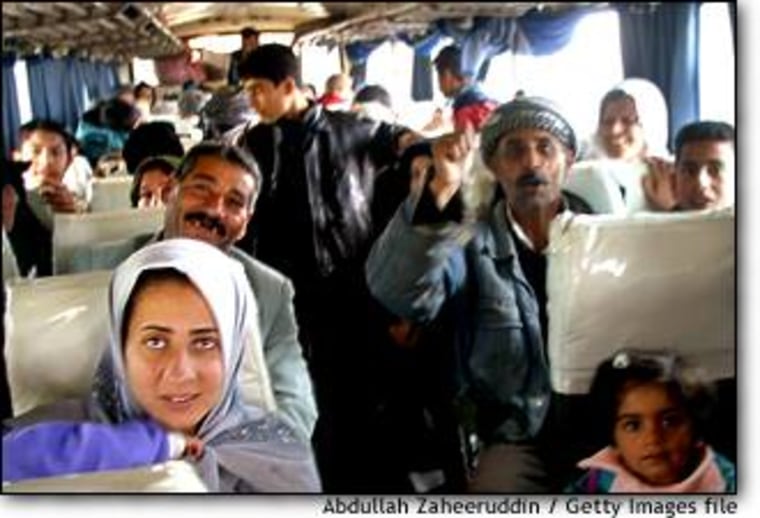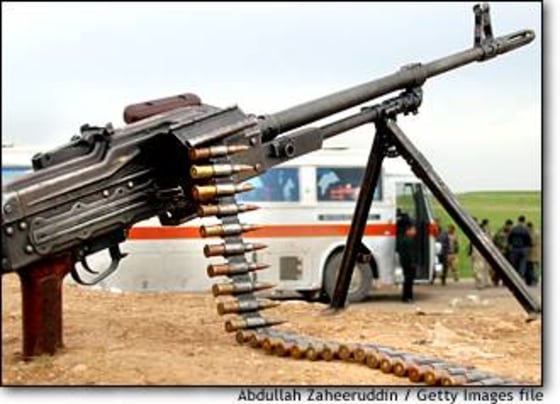On the morning of Feb. 19, a half-dozen large trucks rumbled through the rugged landscape of northern Iraq and stopped on a pleasant, stepped hill set against a rise of caramel-colored cliffs. The vehicles disgorged about 100 armed men, dozens of tents, generators and an anti-aircraft gun, locals say.
A tent city soon rose from the fields of Cani Chinara to accommodate the Badr Brigade, an Iranian-backed militia dominated by Shia Muslims who oppose Saddam Hussein’s rule in Iraq. The site provided them a commanding view of approaching vehicle and foot traffic and easy escape into the mountains, if necessary. The brigade has been operating in northern Iraq for a decade, but as war looms, this spot provided a vantage point too good to pass up.
But Kurdish villagers were furious about the encampment in Cani Chinara, which means “eucalyptus tree spring” in Kurdish. Cani Chinara was a favorite destination for Kurdish villagers on a family picnic. Young lovebirds went there to steal a few moments away from the prying eyes of their parents. Local men headed to Cani Chinara to share a drink together. A wedding was held here just a week before the militia arrived.
The arrival of Badr Brigade reinforcements in Kurdish-controlled areas such as this one underscores the complexities of the Bush administration’s planned “regime change” in Iraq.
Despite sharing a common purpose in the effort to topple Saddam, armed Iraqi opposition groups and their proxy powers have competing interests likely to emerge after a war.
The expected rush by opposition and ethnic groups to reclaim land or seek revenge for the Iraqi leader’s oppressive policies will force U.S. forces to establish immediate control over areas prone to ethnic and tribal conflict, experts and officials here say.
Eying Kirkuk
The test case, many say, will come in Kirkuk, an oil-rich city 150 miles north of Baghdad where Saddam has sought to “Arabize” a historically Kurdish area. His campaign to boost the Arab population of Kirkuk has displaced tens of thousands of minority Kurds, traditionally opponents of the Iraqi leader’s rule.
If Saddam falls, thousands are expected to return to reclaim property and reunite families split by Saddam. In a March report, Human Rights Watch warns that a new Iraqi government, or occupying power, will face ethnic violence in Kirkuk unless steps are taken to manage the return of displaced Kurds.
At the same time, neighboring Turkey has fanned tensions by stating that ethnic Turkomans, also a minority in Iraq, are the rightful claimants to Kirkuk as their capital.
Kurds see Kirkuk as an economic lifeline and their historic right. That, too, worries Turkey, which has spent years suppressing the separatist ambitions of its own Kurdish population. A prosperous Kurdish population in Iraq could reignite Kurdish nationalism in Turkey. In a clear warning to Kurds on both sides of the border, Turkey has positioned troops and tanks up to 20 miles from its border with Iraq.
“The Unites States wants to stabilize Kirkuk to avoid a free-for-all,” says David Phillips, an expert on Iraq’s opposition groups at the Council on Foreign Relations and an adviser to the U.S. State Department. “It’s essential to secure Kirkuk to keep it from blowing sky high.”
Plenty of unity
To that end, the Pentagon envisioned opening a northern front in a war against Saddam to pre-empt any bloodletting in Kirkuk, but that plan was halted by the Turkish parliament’s refusal to allow U.S. troops to base on Turkish soil. The alternative, analysts say, would be for Washington to insert forces by air rather than land. Fewer troops would be available to U.S. commanders. Still, securing Kirkuk is seen as a necessary risk.
“Either way, there will be a northern front,” said Phillips. “Either way, Kirkuk will be secured.”
As a battle with Saddam draws nearer, Washington is making clear that it will have little tolerance for postwar chaos among Iraq’s religious and ethnic groups. President Bush, in a national press conference last week, said, “Iraq will provide a place where people can see that the Shia and the Sunni and the Kurds can get along in a federation” — a clear indication that Iraq’s future government will be determined by geographically defined federal units rather than ethnic groups.
Although the main Iraqi opposition groups have pledged unity at two anti-Saddam conferences in the last three months, on the ground in northern Iraq, the distrust is palpable.
‘We hate the Arabs’
In his office above the main street of Darbandekhan, a busy town 15 miles from the Iran-Iraq border, Mahmood Amid can barely disguise his anger at the presence of the Badr Brigade.

“We hate the Arabs from Iran ordered to interfere with our affairs,” said the local representative of the Kurdistan Socialist Party. “The people who live here are not happy about them at all.”
The Badr Brigade is the military wing of the Supreme Council for Islamic Revolution in Iraq, or SCIRI, an Iran-based Shia Muslim organization that wages a guerrilla war against Saddam’s forces. Shia Muslims make up some 60 percent of Iraq’s population, while rival Sunni Muslims, a group that includes Saddam, represents only 30 percent of the Iraqi population, control the government. Kurds and Turkomans make up about 15 percent and less than 5 percent of Iraq’s population, respectively.
For years, the Badr Brigade’s presence in Kurdish-controlled northern Iraq seemed like a good fit. Often paired with Kurdish “peshmerga” fighters, the militia staged hit-and-run attacks on Saddam’s troops.
But now that a U.S.-led attack on Iraq and Saddam’s ouster appear imminent, old alliances appear to be giving way to mutual suspicions.
Iran's agenda
In the event of a war, the Badr Brigades will likely pass through Kurdish areas and head south beyond Baghdad, where the majority of Shias live. But Kurds say they fear the Badr units will stay in their area as they carry out their orders from Iran to eliminate Iranian opposition groups such as Mujahedeen al-Khalq, an extremist movement funded by Saddam.
Kurds are largely powerless to stop the Badr units. Eight hundred Badr Brigade soldiers recently staged a show of strength in western Kurdistan. In the absence of Iraqi border controls along the northern frontier with Iran, Tehran has fairly free rein to send its agents into northern Iraq.
Meanwhile, the Kurds, staunch supporters of Washington, say they will enforce strict control over those returning to Kirkuk.
“Fifty percent of the population of Kirkuk right now is Kurd,” said Noshirwan Mustafa, an influential advisor to the Patriotic Union of Kurdistan, one of the two political parties that control northern Iraq. “We can either tell them to attack or to keep calm in Kirkuk. We will tell them to keep calm.”
MSNBC.com’s Preston Mendenhall is on assignment in Iraq.
